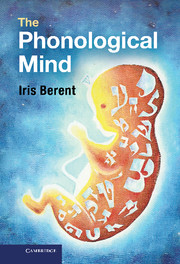Book contents
- Frontmatter
- Contents
- Figures
- Tables
- Copyright acknowledgements
- Preface
- Part I Introduction
- Part II Algebraic phonology
- Part III Universal design
- Part IV Ontogeny, phylogeny, phonological hardware, and technology
- 9 Out of the mouths of babes
- 10 The phonological mind evolves
- 11 The phonological brain
- 12 Phonological technologies: reading and writing
- 13 Conclusions, caveats, questions
- References
- Index
10 - The phonological mind evolves
Published online by Cambridge University Press: 05 February 2013
- Frontmatter
- Contents
- Figures
- Tables
- Copyright acknowledgements
- Preface
- Part I Introduction
- Part II Algebraic phonology
- Part III Universal design
- Part IV Ontogeny, phylogeny, phonological hardware, and technology
- 9 Out of the mouths of babes
- 10 The phonological mind evolves
- 11 The phonological brain
- 12 Phonological technologies: reading and writing
- 13 Conclusions, caveats, questions
- References
- Index
Summary
In previous chapters, we have considered the possibility that the human mind possesses a system specialized for phonological patterning. How special is this capacity? Is it unique to humans, or shared with other animals? To address this question, we examine three defining features of human phonological systems: (a) their reliance on algebraic computational machinery, (b) their assembly by the conjunction of learning and universal, substantive constraints, and (c) their tendency to optimize analog phonetic pressures using algebraic means. We next proceed to investigate whether those three capacities are available to nonhuman animals. Anticipating the conclusions, neither algebraic machinery nor the capacity to shape communication patterns by both learning and innate knowledge are uniquely human, as each of these separate capacities is widely attested in the animal kingdom. But surprisingly, few species combine them in their natural communication systems, and no comparable case is attested in nonhuman primates. Precisely because these two ingredients (algebraic machinery and substantive constraints) are widely available to nonhumans, their unusual conjunction in human phonology is likely due to some modification to the human genome and brain that regulates the spontaneous, systematic capacity of humans to engage in phonological patterning.
The human phonological instinct from a comparative perspective
The discussion in this book has so far concerned itself with the specialization of the phonological mind – whether humans possess a specialized mechanism, equipped with innate universal constraints that specifically target the structure of phonological patterns. The question of specialization is important because it touches on the age-old debate concerning the origins of human knowledge – whether our knowledge and beliefs are induced from experience, or shaped a priori by our biology. The results presented so far open up the possibility that the phonological mind might indeed be specialized in this manner. We have seen that disparate phonological systems manifest a uniform design that distinguishes them from nonlinguistic patterns, speakers of different languages exhibit knowledge of these principles even when they are unattested in their language, and there is some evidence that this design is present already in early development. All these results suggest that the phonological mind might be a specialized system of core knowledge. But once the possibility of specialization arises, a new question immediately comes to mind: Is this design special? Is the makeup of the phonological mind similar to other systems of animal communication, or is human phonology unique in some way?
- Type
- Chapter
- Information
- The Phonological Mind , pp. 226 - 250Publisher: Cambridge University PressPrint publication year: 2013



